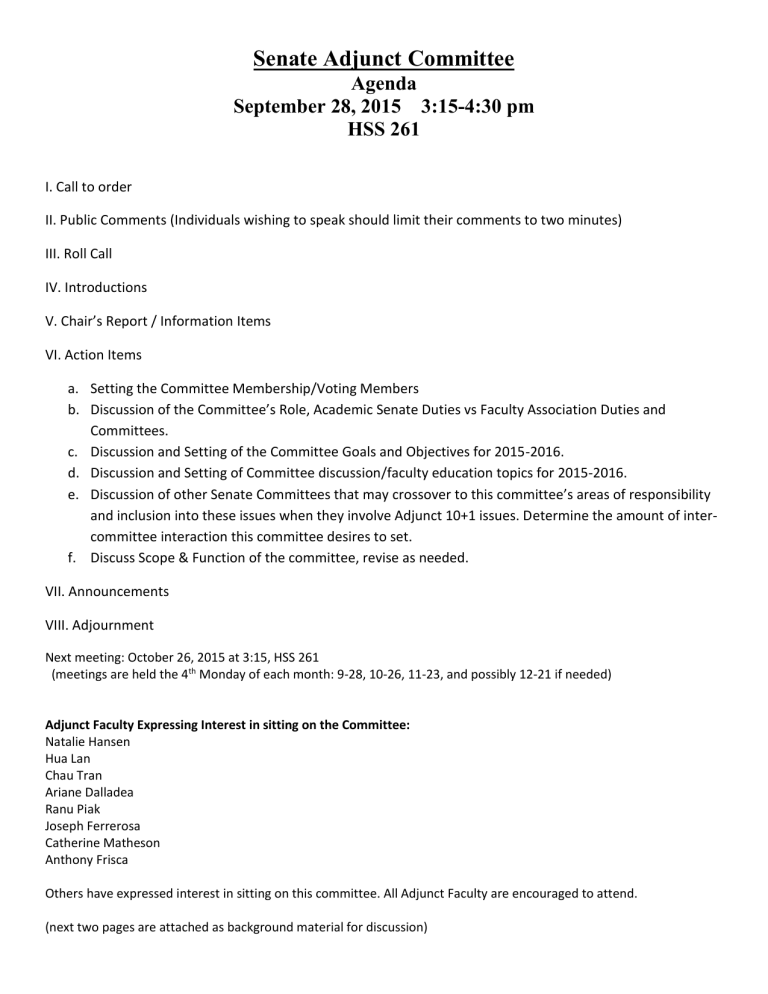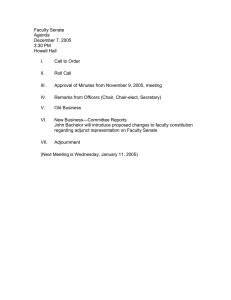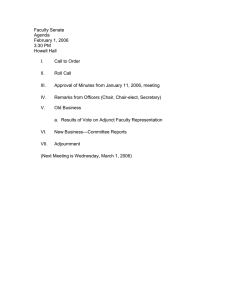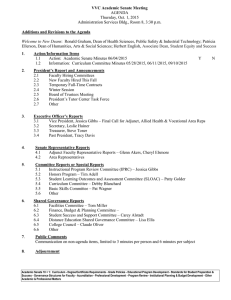Senate Adjunct Committee Agenda September 28, 2015 3:15-4:30 pm

Senate Adjunct Committee
Agenda
September 28, 2015 3:15-4:30 pm
HSS 261
I. Call to order
II. Public Comments (Individuals wishing to speak should limit their comments to two minutes)
III. Roll Call
IV. Introductions
V. Chair’s Report / Information Items
VI. Action Items a.
Setting the Committee Membership/Voting Members b.
Discussion of the Committee’s Role, Academic Senate Duties vs Faculty Association Duties and
Committees. c.
Discussion and Setting of the Committee Goals and Objectives for 2015-2016. d.
Discussion and Setting of Committee discussion/faculty education topics for 2015-2016. e.
Discussion of other Senate Committees that may crossover to this committee’s areas of responsibility and inclusion into these issues when they involve Adjunct 10+1 issues. Determine the amount of intercommittee interaction this committee desires to set. f.
Discuss Scope & Function of the committee, revise as needed.
VII. Announcements
VIII. Adjournment
Next meeting: October 26, 2015 at 3:15, HSS 261
(meetings are held the 4 th Monday of each month: 9-28, 10-26, 11-23, and possibly 12-21 if needed)
Adjunct Faculty Expressing Interest in sitting on the Committee:
Natalie Hansen
Hua Lan
Chau Tran
Ariane Dalladea
Ranu Piak
Joseph Ferrerosa
Catherine Matheson
Anthony Frisca
Others have expressed interest in sitting on this committee. All Adjunct Faculty are encouraged to attend.
(next two pages are attached as background material for discussion)
Academic Senate:
Three sections from the Academic Senate WEB page (Credo)
(http://www.smc.edu/ACG/AcademicSenate/Pages/Academic-Senate-Credo.aspx)
Responsibilities and Rights: Under California law, the academic senate has specific rights and responsibilities in eleven areas:
Curriculum, including establishing prerequisites;
Degree and certificate requirements;
Grading policies;
Educational program development;
Standards or policies regarding student preparation and success;
College governance structures, as related to faculty roles;
Faculty roles and involvement in accreditation processes;
Policies for faculty professional development activities;
Processes for program review;
Processes for institutional planning and budget development; and
Other academic and professional matters as mutually agreed upon.
For the college to prosper, the college must rely on the expertise of faculty. Legislators valued this expertise to such an extent that faculty participation in governance is explicitly expressed in law.
Shared governance: For the legally mandated participation of faculty to be effective, it must support this principle: that the best decisions come from a spectrum of opinion and broad and diverse participation. We have an obligation to speak out for those who are vulnerable. In this challenging time, each faculty member has a special responsibility to help make the best decisions for the college.
Trust and Mutual Respect: We will seek to define through actions what mutual respect and collegiality mean.
Collegiality does not end with congeniality. Mutual respect implies trust and risk-taking. We will offer first steps, and we call on other campus groups to take risks to foster trust on this campus.
Faculty Association
From the Constitution, Article 1
(http://www.smcfa.org/index.php/documents/4-documents-constitution/4-article-i-name-and-purpose)
To Advance the general welfare of the college, its staff, and students by providing an opportunity for continuous study and action on problems of the profession, promoting professional attitudes and conduct among members, and encouraging cooperation between the college and community.
To be the exclusive representative of the bargaining unit(s) in which the association members are included, to represent members relating to employment conditions and employer-employee relations, including but not limited to, wages, hours, and other terms and conditions of employment.
Senate Committees:
Adjunct
Career Technical Education
Curriculum Committee
Department Chairs
Distance Education
Election--Rules
Environmental Affairs
Equity & Diversity
Finance
Global Citizenship
Information Services
Institutional Effectiveness
Legislative
Personnel Policies
Professional Development
Professional Ethics & Responsibilities
Program Review
Sabbaticals
Social Committee
Student Affairs
Student Instructional Support
Scope and Function of the Committee:
Scope:
Faculty Association Committees:
1. Professional Rights and Contractual Grievance
2. Fiance
3. Instruction
4. Legislation and Public Affairs
5. Faculty Bebefits
6. Nominations and Elections
7. College Envirnoment
8. Part-Time Faculty
9. Membership Education
10. Public Relations
11. Department Chairs
12. Editorial Board
13. Distance Education
14. Governmental Relations
15. Retirement
The Committee addresses issues relevant to adjunct faculty.
Functions:
A.
Provides the Academic Senate with input on both campus issues relevant to adjunct faculty.
B.
Fosters respect and inclusion, collegiality, and professionalism among all faculty, full and part-time.
C.
Interact with adjunct faculty statewide on both faculty and adjunct-specific issues.
(Revised June 5, 2007; 34-0)


